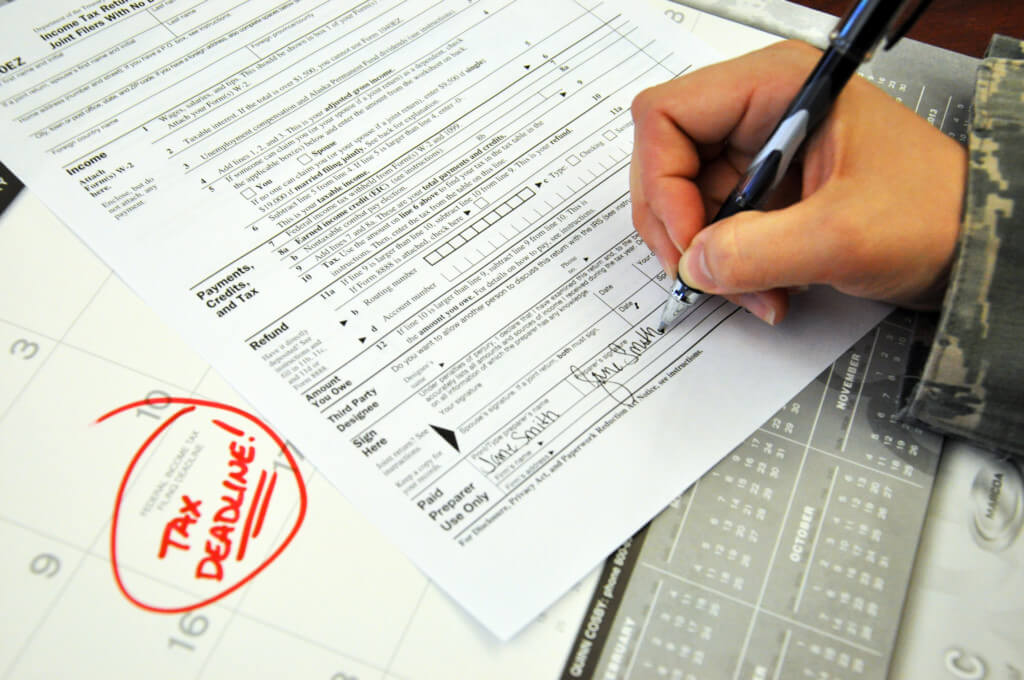A college graduate will go through 16 years of school and receive a piece of paper saying they are officially entering the real world. But come April that student will find they are in fact, not ready. Unless they majored in accounting, those thousands of hours in school will not have taught them one of the basics of being an adult: taxes *shudders.* Full disclosure: I am not an accountant, and I can assure you this will be an extremely simplified version of how to do your taxes if you’ve never done them before.
If your “taxes for dummies” Google search led you here: Welcome, my fellow non-accountant students.

First off, good news and bad news. From this point onward, (students or recent graduates), filing taxes will only get more complicated. The majority of students at this point in their lives have no kids, no house/mortgage, don’t own a business and are not married. So you really do not need to hire anyone to do your taxes for you right now. However, it is not frowned upon to use automatic filing services like TurboTax.
If TurboTax sounds like the best option to you, you can pretty much stop reading after this paragraph and never truly understand the beautiful process of your civil duty as a citizen. No judgement here, as it really is the cheapest way. You can buy TurboTax at numerous commercial locations, usually for around $50 (including the filing fee). Even better, some people qualify to get it for free.
The rest of Turbotax is simple, like filling out an application. All the answers to the personal questions you should already know, and then for the tax questions, you can find all the info you need in your W-2 form. That’s the paper your employer sends you at the end of the year with a summary of how much you made and how much you paid in taxes.
Also check on campus for assistance filing your taxes, as you may groups or programs to help. At New York University, an accounting fraternity called the Beta Alpha Psi helps students with their taxes for free. “At this point of the year there [is] still ample time before tax season actually comes, so we would just recommend students to understand basic tax concepts, know their filing statuses and make sure that they will receive a W-2 when tax season starts if they are working at any point during the year,” the group said. They also suggested two tax guides: Investopedia and your new pal TurboTax.
If you want to live on the edge and file manually though, the magic numbers for students is 1040. The 1040 form has numerous different variations, but we will focus on three: 1040, 1040A and 1040EZ. If you don’t trust me that you most likely will need one of these three, you can take a test to find out what form you need.
1040EZ:
https://www.youtube.com/watch?v=lYobSqd3DUQ
The easiest tax form there is, get it? EZ? It only has two pages and tax payers can download the form off the IRS website and then send in by mail. This form only works for young adults who have no dependents, are single, don’t make over $100,000 and have no adjustments to claim (AKA deductions, which I will explain later, but basically are write-offs to get more money back). While you can complete this two page tax form in under an hour and it will cause you the least stress, if you want to try to get more money back, this form is the most limited.
1040A:
This form is between 1040EZ and 1040. It is considered the “short form” compared to the 1040, as it also only has two pages. With less restrictions than the 1040EZ (where pretty much anyone that makes under $100,000 can file as long as they don’t itemize deductions), the only catch is those who file with this form must take the standard deduction.
Sound confusing? A standard deduction is a number that the government estimates everyone will get deducted from their income. Doesn’t sound like a good thing? Well let’s say for example you make $10,000 that year, and the standard deduction is $4,300. That means you will only be taxed on $5,700 of your income. So deductions are GOOD. If you don’t take the standard deduction, you will have to itemize your deductions, which means going through all of your expenses and income to find out exactly how much you will be deducted.
When it comes to students filing taxes, NYU accounting professor Paul Zarowin only had two important pieces of advice. “Take the standard deduction, and use the short form if possible,” Zarowin said. This advice tends to be the most common thing students do. Without a house/mortgage, the standard deduction usually is a better deal than what you would get if you itemized, and the 1040A (aka short form) is simpler than the 1040.
1040:
This brings us to the last option, “the long form” 1040. This one is the form for anyone filing individually, AKA not a business. You have to use this form if you make over $100,000. Which if that is the case, what are you doing reading this? You have obviously already succeeded at life.
More practically though, this is the form you use to itemize deductions, which I described above. However, I do have a nugget for all you students. You will want to file a 1040 IF you want money back for school expenses. (Note: This is only if you file independently, which I will get into next) Yes, even the government feels bad for us students, and they offer an education tax credit.
This means that you can earn up to $2,500 over the course of four years. This is not a deduction (like I described above, where it takes off your income and you get taxed on less) No, this is cash given back to you over the course of four years. That means you can’t file this more than four years, so plan accordingly. This would be the only reason you would want to file a 1040, to get this credit. Remember you can only do it if you file independently. This also does not mean you have to itemize deductions. You can take the standard deduction and the tax credit.
But what is independent vs. dependent?

These words pretty much mean the same things in the tax world as they do in the real world. If you file as an independent, this means you are not still living with your parents, they are not paying for your school AND they are not paying for your rent/housing. So yes students, while you think you may be independent and off living on your own away from your parents, you are legally still a dependent if they pay for everything.
However, you can file as an independent if you pay for your rent and your school is covered by loans. Also note this takes some communication with whoever was claiming you as a dependent before. You can’t just up and decide you’re going to file independently this year. If someone claims you as a dependent on their tax form (i.e. your parents) and you try to claim independent, the IRS will hold your taxes and do an investigation.
If you file independently as a student, you get more of a tax deduction. Sometimes, if you take the standard deduction, file independently and make an average, minimum wage amount that year, everything can cancel out and your income can be $0, thus you won’t be taxed on anything and you might not even need to file. However it is strongly advised you file because you most likely will get money back and it will be better for you in the future.
Another good reason to file independently? MORE MONEY. Again, the government notices the struggle bus that is college. If you file independently and then fill out your FAFSA as an independent, you are likely to get so much more in loans than if you are a dependent.
In case you didn’t already know, the deadline to file taxes is always in April.

Break it down *beatbox noises*
W-2: Form you get from your employer telling you how much you made and how many taxes were taken out.
Standard deduction: The averaged amount a government decides will be deducted from your income for the many people who don’t want to find the actual number.
Itemizing deductions: Like mentioned above, its for people who want to calculate everything and find how much the government should deduct. (Not recommended)
Deducting from your income: This is okay. This doesn’t take away your money. It only takes away from the amount of your income you are going to be taxed on.
1040EZ: If time is money for you, this is the easiest form. It is the fastest but will get you back the least amount of money.
1040A: The middle ground. A little less restrictions on who can file for this but it’s still only two pages. Must take standard deduction, no itemizing.
1040: Why did you have to go and make things so complicated? This is the longest and most time-consuming forms. But if you think you deserve more back from the government and want to go through your finances to prove that, this one’s for you.
Dependent: Your parent claims you as a dependent and you get less money deducted from your income. If you have an income; please have an income.
Independent: Must be providing for yourself. Loans are okay if they are paying for your school and in your name, but not okay if your parents are paying for your school and/or living quarters.
6 More Tips for Filing Your Taxes
Written by Tanjeen Twinkle
Mastering the art of tax filing can feel kind of like facing down a nightmare. We’ve watched our parents do it for years and they still complain about it, year after year. Most students in college don’t have a clue on how to file their taxes. With tax season coming up, the time has come to kill that fear. Follow these tips to kill your tax filing the first time around.
1. Start Preparing Early

Taxes are due tomorrow, and you don’t have all the documents you need. What you do have looks really confusing and, honestly, you don’t really know what you’re doing—everything has gone wrong. Always start prepping early, like a month in advance, to avoid this nightmare. The deadline to file a tax return is on April 17, 2018. If you owe taxes, make a note to file as soon as you can, and visit the IRS website to find out the documents you need. This will help minimize the interest and penalty charges. On the bright side, you won’t face a penalty for filing a late return if the IRS owes you a refund on your taxes. Taxpayers can often get a tax refund on their income tax if the tax they owe is less than the sum the taxes withheld on their paycheck and estimated taxes they paid, as well as the refundable tax credits they can claim.
2. You Can’t Claim Tax Exemptions If You are a Dependent

You may feel I-N-D-E-P-E-D-E-N-T while filing taxes, but that doesn’t mean a government document doesn’t say otherwise. You need to know beforehand if you’re registered as a dependent on your parents’ tax returns. Understanding what this means will help when it comes to filing taxes. “Now that students are able to file, they should confirm if their parents are still claiming them as a dependent. If so, they should indicate on the return that they are claimed as a dependent,” said Erica Booth, the president and CEO of Erica Booth Tax & Accounting Services said. According to the Internal Revenue Service (IRS), a dependent must be either a “qualifying child” or a “qualifying relative” who meets certain conditions, such as age requirements, income, or full-time student status. Since most college students will fall into the dependent category, the average student should keep in mind that they can’t claim tax exemptions.
3. File a Return If You’re Eligible To

Make sure you send in all the documents you have, even the ones you don’t think you need to— just to play it safe. For example, if you have paychecks that have tax withheld, you might think you don’t need to send that in to the IRS. That isn’t always the case. Even if you can’t legally file a tax return, you still should because the government may owe you money. If you make over $6,300 in income, make sure you fill out a W-2—without it, you can’t file for the tax return even if you have eligibility. “The threshold to file as a single filer is $10,400 for 2017 tax returns. If the student makes less than $10,400 they can still file as they will most likely receive the federal tax withheld as a refund. I suggest filing, it wouldn’t hurt and a few hundred dollars back is super helpful as a college student,” said Booth.
4. Don’t pay to file taxes

During tax season, you may receive a mysterious phone call from an unknown company or the “IRS” telling you that you must pay to file your taxes. Don’t believe them. College students, just like anyone else, can use the IRS’s Free File program. If your annual household income ends up less than $64,000, you can use the Free File Program at the IRS site. If you earn an income greater than $64,000, ignore our #brokeAF jealousy and file for Free Fillable Forms instead. You’ll find these forms alongside the Free File Program, and the website has a PDF of the guidelines for these forms.
5. Beware of Scams

Relatedly, if a random number tries to call you up and claim you owe a certain amount of money to the IRS, don’t listen to them. Some people will actually create scams to take your money that take advantage of people’s confusions about taxes. These callers will threaten people and tell them that if they don’t pay them the money that they owe the IRS, they can go to jail, sparking some serious fear and anxiety in the people targeted. Npr.org contains examples of real life tax scams with the actual voice recordings you can check out if you feel worried. And if you ever get calls you think might be scams, then call the IRS directly after.
6. Double Check Everything Before Submitting

As you finish filing for taxes, everything looks great. Your math looks right, your spelling doesn’t have any errors and you have all your documents ready to go. You seal the envelope, place it in the mail and then two days later realize you forgot to sign and date your return. Once you send in your taxes, you can’t get your documents back to fix anything. Basically, you’re screwed. You’ll want to double check your signature, dates and math, and proofread for errors and omissions. Read the instructions carefully and double-check your documents before sending them in. You can even use E-filing—filing for taxes online at the IRS website—to help you reduce errors by automatically checking your return before you submit it.
Updated on December 19, 2017 to include “6 More Tips for Filing Your Taxes” by Tanjeen Twinkle



















